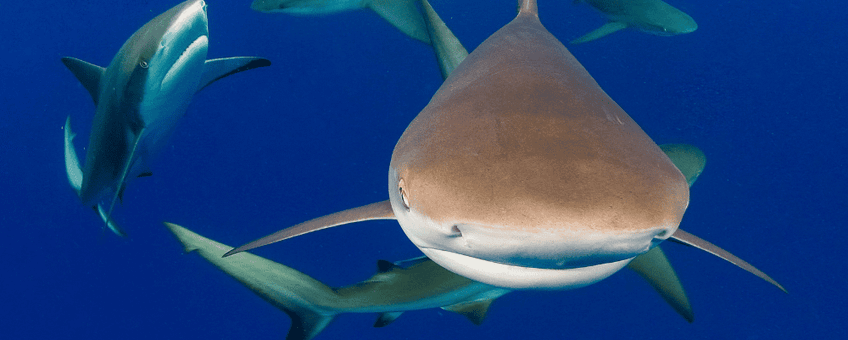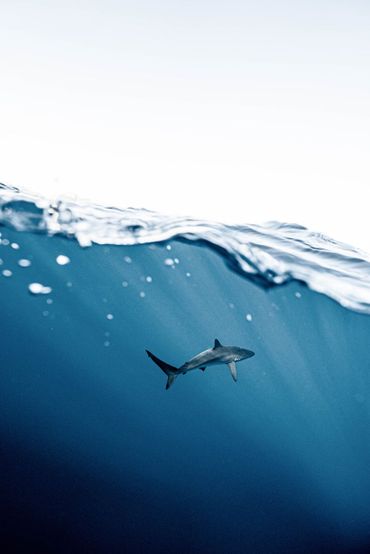
Silent reef keepers: the fight to save the Caribbean reef shark
Dutch Caribbean Nature Alliance (DCNA)The Caribbean Sea is renowned for its crystal-clear waters, vibrant coral reefs, and a dazzling array of marine life. Among the charismatic inhabitants of this underwater paradise is the Caribbean Reef Shark (Carcharhinus perezii), a species that plays a crucial role in maintaining the health of coral reef ecosystems. In the Dutch Caribbean, these apex predators face mounting threats, but there is hope on the horizon. At the upcoming Conference of Parties for the Cartagena Convention (COPs), the Kingdom of the Netherlands will seek increased protection for these magnificent creatures by listing this species on Annex III of the SPAW Protocol. Annex III includes plant and animal species which require additional protection to ensure this species is able to adequately recover their populations in the Wider Caribbean Region.
 Caribbean reef shark (Source: Elianne Dipp)
Caribbean reef shark (Source: Elianne Dipp)
Importance
Caribbean reef sharks thrive in warm, tropical waters of the Caribbean region, with a distribution range that stretches from Florida to Brazil. This species is one of the most encountered reef shark species throughout the whole Caribbean Sea. Growing up to three metres (9.8 feet) in length, this shark is one of the largest apex predators in the reef ecosystem and is at the top of the marine food web, having only a few natural predators.
In addition to being of great economic value – as shark diving is a major draw for divers from around the world – this species is also critical for maintaining balance within the reef ecosystem. Their presence helps regulate the population of smaller prey species, which in turn prevents overgrazing on seagrass beds and coral reefs and eliminates sick or weak fish from the population. This balance is essential for maintaining the health and diversity of the entire coral reef.
Threats
Despite their ecological and economic significance, Caribbean reef sharks in the Caribbean face numerous threats that have led to a population reduction estimated to be between 50 and 79 percent over the past 29 years. In the (Dutch) Caribbean this is mainly caused by:
Habitat degradation: the degradation of coral reefs and seagrass beds due to climate change, pollution and coastal development has a direct impact on the availability of prey for these sharks. Loss of habitat reduces their ability to find food and shelter.
Overfishing: overfishing poses one of the most immediate threats to Caribbean reef sharks. They are often caught incidentally in commercial fisheries, where fishermen are targeting other species, or intentionally, where they are sought after for their fins, used in shark fin soup.
A call for increased protection
There are different organizations and individuals working to protect sharks and their habitats in the Dutch Caribbean. A significant milestone was the establishment of protected areas such as the Yarari Marine Mammal and Shark Sanctuary between Bonaire, Saba and Sint Eustatius. Another milestone was in 2019 when the Dutch government adopted an International Shark Strategy (pdf: 1.1 MB). The strategy sets out which protective and management actions for sharks and rays are to be taken by the government in all seas and oceans where the Netherlands has influence (including the Dutch Caribbean). Additional efforts are still needed to create more marine protected areas, enhance enforcement, reduce pollution in the ocean, and promote sustainable fishing practices. These species know no (political) boundaries and their protection requires broadscale conservation efforts within the Dutch Caribbean and beyond.
Conclusion
The Caribbean reef shark is a species of paramount importance to the (Dutch) Caribbean's coral reefs. With the extra protection being requested during the next COPs meeting in Aruba, there is hope that this species will have a healthy future. By recognizing their ecological significance and the challenges they face, we can work together to ensure a brighter future for the Caribbean reef shark in the Dutch Caribbean and beyond.
DCNA
The Dutch Caribbean Nature Alliance (DCNA) supports science communication and outreach in the Dutch Caribbean region by making nature-related scientific information more widely available through amongst others the Dutch Caribbean Biodiversity Database, DCNA’s news platform BioNews and the press. This article contains the results from several scientific studies but the studies themselves are not DCNA studies. No rights can be derived from the content. DCNA is not liable for the content and the in(direct) impacts resulting from publishing this article.
Text: DCNA
Photos: Jim Abernethy; Elianne Dipp
